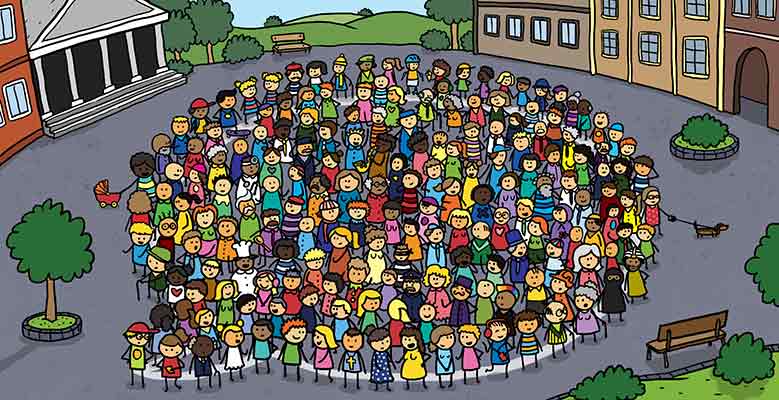
Every minute of every day 20 people are forced to leave their homes because of violence, war, or persecution. Worldwide, a total of 70.8 million people (25.4 million of whom are refugees) have been displaced, more than at any point in human history.
Numbers that huge can be so hard to understand that we might begin to forget or ignore the human lives behind them. These are people: people who’ve had to leave behind everything they know in search of a safe place to call home.
This World Refugee Day, as we welcome people who are refugees or those who are displaced to our communities, we hope you’ll join us and our partner, the International Rescue Committee (IRC), in seeing them, honoring their stories, and demanding that our leaders take immediate action to protect and advance their rights all over the world.
Contributing to Our Communities
So many studies highlight how refugees provide a huge boost to the economy wherever they go. Think about it: refugees bring a startling range of experiences with them—they’re doctors, farmers, engineers, scientists.
Case in point: Albert Einstein. You’ve probably heard of him—Nobel Prize winner, brilliant scientist, global cultural icon. But you might not know that he was also a refugee who came to America in 1933 after fleeing the Nazis. In fact, he helped found IRC!
Refugees routinely make remarkable contributions to science, culture, and the arts. Here are just a few examples:
- Madeleine Albright, former US Secretary of State, escaped Czechoslovakia with her parents shortly after the Nazis invaded in 1938
- Singer M.I.A. came to London at the age of 9 to escape a civil war in her native Sri Lanka
- The Kurdish Iranian writer Behrouz Boochani won Australia’s richest literary prize—while living in a detention center seeking asylum
- One of the founders of Google, Sergey Brin, was a refugee from the Soviet Union
- Freddie Mercury, former Queen lead singer, fled violence in Zanzibar to settle in the UK
What Is World Refugee Day, Anyway?
The first World Refugee Day was observed in 2001, to mark the 50th anniversary of the 1951 Refugee Convention. Since then it has been celebrated on June 20 every year.
Officially, It’s the day when the UN updates its count of displaced people around the world. But it’s much more than that too. On World Refugee Day, we go beyond the numbers to highlight the contributions that refugees have made everywhere they’ve ever gone.
Arms Wide in Welcome
Imagine all we would miss out on if refugees weren’t able to settle in our neighborhoods, towns, and cities. But the benefits go beyond economic gain and specific innovations and ideas.
Studies have demonstrated that diversity itself just flat out makes us better: the more diversity around us, the smarter and more creative we become (and we work harder too). In fact, the earlier we experience diversity, the better: diverse classrooms help students score higher on tests and lead to increased college enrollment.
Despite the many unfounded myths and fears about refugees, it’s clear that welcoming them to our communities isn’t just a good thing, or even just the right thing, to do—it helps society thrive. We need them. And the truth is, right now, they also need us.
Take Action
The refugee crisis isn’t going away. Remember those numbers we mentioned earlier? Hopes and wishes aren’t going to solve a problem of this magnitude. Millions of people, many of them children, are seeking shelter and safety. They have been through experiences most of us cannot even begin to imagine. What they want isn’t extreme or controversial. They only want what we all want: a safe place to call home.
We’re calling for systemic changes in three areas that will ensure all refugees are treated with respect, fairness, and justice. First, displacement of communities due to war, violence, climate change is a worldwide problem and so worldwide cooperation is needed to solve it. Second, every individual country needs to ensure that its asylum process is humane and effective. Finally, we need to encourage more understanding between host communities and newcomers.
We don’t have all the answers, but we do know that if we all work together, we can make a big difference in the lives of millions of people.


